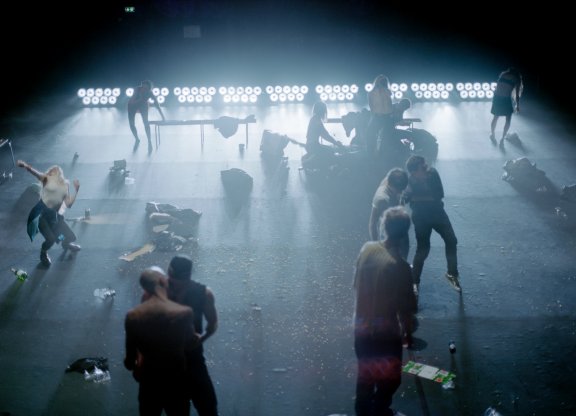24.09.21 > 5.11.22
La Station - Gare des Mines, CN D à Pantin, MC93 — maison de la culture de Seine-Saint-Denis, Bobigny
The body as a locus for developing knowledge and questioning our culturally constructed systems of perception: this is the main thrust of Gisèle Vienne’s residency at the Centre National de la Danse. The choreographer, director and visual artist has conceived this exceptional period of companionship in 2021 and 2022 as a space for experimentation that resonates with the various missions of the CN D, from creation to research and teaching. Since the CN D is a symbolic place for dance, where history is written and rewritten, Gisèle Vienne wishes to propose a reflection on the political and societal issues at stake in the field of choreography. As an extension of her choreographic work, her residency associates artists and theorists in a desire to reorient the gaze, analyse and deconstruct systems of domination, and place the sensory dimension and gesture at the heart of the process of thinking.
In autumn 2021, in collaboration with Elsa Dorlin, a professor of contemporary political philosophy at the University of Toulouse - Jean Jaurès, Gisèle Vienne will present a series of podcasts produced by the CN D as well as a seminar. A regular visitor to Pantin for many years now, Gisèle Vienne’s company will also be hosted at the CN D. A docufiction was filmed there earlier this year, based on Jerk, the dark reenactment of the crimes perpetrated by the American serial killer Dean Corll, staged by the choreographer in 2008. As part of the Portrait that the Festival d’Automne in Paris is devoting to her in 2021, Gisèle Vienne is also presenting, again in collaboration with the CN D, a revival of Crowd at the MC93, along with a new production at La Station - Gare des Mines. Inspired by the trajectory of the isolated characters in Crowd, this performance centred on a party and the emotional perception of time – a theme that resonates in a new sense in the recent context – will reinterpret their gestures to evoke the body, placed out of bounds but yearning contact with others.
